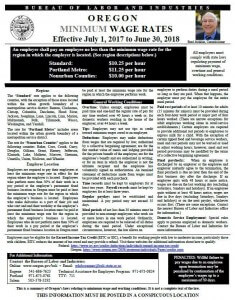 Last year, the Oregon Legislature determined there was a need to push the state’s minimum wage rate higher than the minimum wage rate then in effect. The minimum wage rate, which was tied to the Consumer Price Index (CPI), remained unchanged since 2015 because of a flat inflation rate.
Last year, the Oregon Legislature determined there was a need to push the state’s minimum wage rate higher than the minimum wage rate then in effect. The minimum wage rate, which was tied to the Consumer Price Index (CPI), remained unchanged since 2015 because of a flat inflation rate.
After studying the regional cost of living, low-wage worker demographics, unemployment and wage rate statistics, the Legislature set up a tiered minimum wage system. It divided the state into three geographic regions and established higher minimum wages rates for each region beginning July 1, 2016. It also established a series of future minimum wage rate increases for each region.
Oregon’s Minimum Wage Rate Regions
The amended Minimum Wage Law establishes a “standard” minimum wage rate, a minimum wage rate for businesses located in the “Portland metro” area, and a separate minimum wage rate for businesses located within specified “nonurban” counties. Employers located in the Portland area must pay a higher minimum wage rate than the standard and nonurban county rates.
Minimum Wage Rate Increases
The 2016 minimum wage rates boosted workers’ pay in each region by 5%. This year, the minimum wage rate in rural regions is increasing by 5%, while the minimum wage rate in the Portland metro area is increasing by 15%.
The 2017 minimum wage rates are as follows:
- Standard region: $10.25 per hour
- Portland metro: $11.25 per hour
- Nonurban counties: $10.00 per hour
The State’s minimum wage rates will continue to increase over the next six years. The minimum wage rate peaks on July 1, 2022 at $14.75 per hour for the Portland metro area. Beginning July 1, 2023, and each year thereafter, the minimum wage rate will be adjusted for inflation based on the Consumer Price Index.
Minimum Wage Posting
The 2017 Oregon Minimum Wage posting has been revised to reflect the current regional minimum wage rates and effective dates. In addition, new text has been added that notifies employees of possible eligibility for the Earned Income Tax Credit (EITC). The EITC is available to people with low to moderate incomes, particularly those with children. The credit may reduce taxes owed or provide a refund. The minimum wage notice provides the websites for Federal and Oregon EITC information.
Oregon employers are required to post the revised Minimum Wage posting each year. This year, Oregon employers can remain compliant with the minimum wage posting obligation using Compliance Poster Company’s 2017 Oregon Minimum Wage Peel ‘N Post™ for their existing Oregon All-On-One™ Posters, or by purchasing a new Oregon All-On-One Poster.

